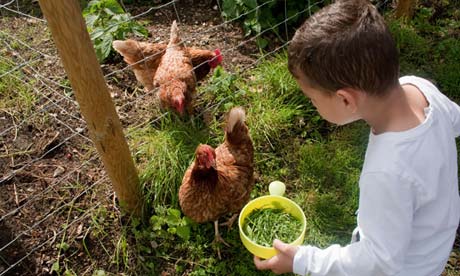O artigo abaixo, e que foi repercutido pelo jornal The Guardian, aborda o ressurgimento na Inglaterra da criação de galinhas em residências. As razões para isso são variadas, mas incluem a desconfiança que o público britânico possui cada vez mais em relação ao que é fornecido pela indústria da carne animal.
Esse ressurgimento da criação de animais em nível doméstico ocorre em uma das economias mais fortes do planeta. Enquanto isso, aqui na periferia do capitalismo são os mais pobres que mantém essa prática. O curioso que aqui isso é visto como coisa de gente pobre e atrasada. Pelo jeito, os pobres daqui oferecem o modelo pelo qual os ricos ingleses estão querendo viver. Não deixa de ser curioso!
Eggs come first as chickens take over our gardens
Fears about food quality and desire to be close to nature fuel a growing backyard industry in Britain
Tracy McVeigh, The Observer

Pet shops and garden centres now stock chicken feed while demand for poultry is rising. Photograph: Angela Hampton pictures/Alamy
They are the planet's closest living evolutionary link to Tyrannosaurus rex and contribute hugely to our national diet, but now the humble chicken is coming into its own in Britain as the productive pet of choice.
What began several years ago as a trend among town-dwellers with large gardens has now exploded into an entire industry, say experts. Pet shops and garden centres stock chicken feed, while poultry producers are scrambling to keep up with demand for birds. Dozens of manufacturers are churning out hen coops in every shape and size – and for every budget. Prince Charles's Highgrove online shop stocks a pale-blue timber portable hen house for £3,750.
This weekend the South of England show at Ardingly, West Sussex, the biggest annual agricultural event in the south-east, took poultry as its theme in response to what organisers called "an incredible upsurge in popularity of keeping poultry".
And it's not only hens, but ducks, too. "A lot of it is the horsemeat scandal: people just want to be more connected to their food," said the show's Paula Seager.
Sylvia Brown, running the Arun Valley Poultry Fanciers stall, said: "There's a real rush for people to get into raising and breeding chickens. People are very keen. I think it's because of the eggs – everyone really wants a bit of self-sufficiency, and you can't keep a cow in your back garden."
Lou Aplin, visiting the show from Rustington, West Sussex, said: "My husband bought another bike, and I said, 'Well, I'm having chickens.' So that's what brought me here. They lay eggs, they are friendly – I can't think of anything better. If people complain about the noise, I think they're silly. I'd rather hear a cockerel than a seagull. I have really caught the bug."
Next week sees the publication of the latest book in Hugh Fearnley-Whittingstall's River Cottage series. Titled Chicken & Eggs, it is a step-by-step guide for beginners written by Mark Diacono.
Poultry expert Andy Marshall writes the Poultryman's Diary in Practical Poultry, the best-selling of several British magazines devoted to the subject. "The chicken coop has become a bit of a must-have add-on for every garden now," he said. "More and more people are trying to [keep hens] and more and more people would like to do it. We're seeing lots of schools starting to get involved and there is a huge upsurge of interest in pure breeds.
"I think what we have is a generation of people who are totally disconnected from the countryside. Then they have children and want to link up again.
"All this enthusiasm is wonderful, but we do have a lot of people buying birds who don't have a clue, and I am concerned for the welfare of all the birds being sold out there. Today's society loves a quick fix, and while chickens are very easy to care for and to enjoy getting eggs from, they do need to be fed and looked after, so do a bit of basic research before you rush off and buy your hen house and your four chickens. Huge numbers of poultry clubs are springing up, and they offer courses in the basics."
Marshall was very definite on the amount of space that poultry need: "Four square feet per chicken."
With the agriculture sector hit by dreadful weather and high feed costs, this feathered trend of DIY poultry-keeping is helping British chicken breeds to thrive.
"In terms of the industry, it's massive: You can buy fertilised eggs on eBay, and coops at your local garden centre," said Marshall. "Poultry has become very big business."
